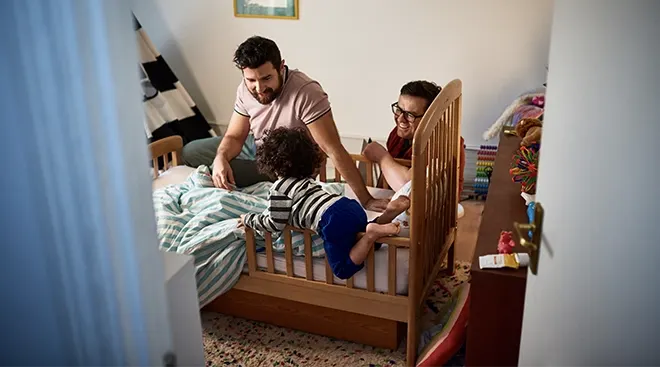1 in 4 Parents Struggle to Get Their Kid to Bed, Study Shows
Getting your child to bed can feel like running a marathon some nights, and a new study from the C.S. Mott Children’s Hospital National Poll on Children’s Health reveals that you aren’t alone.
The new study reveals that 1 in 4 parents find bedtime challenging. Using a national sample of parents with children aged 1-6 years, researchers examined their bedtime routines and sleep environments. It found that the majority of parents (90 percent) have some form of bedtime routine. These routines often include brushing teeth (90 percent), reading bedtime stories (67 percent), and bathing (54 percent). Other common activities include having a drink of water (47 percent), turning off devices (41 percent) and praying (31 percent).
Responses show that sleeping arrangements across the nation are diverse, with 47 percent of children sleeping in their own bedroom, 21 percent sharing a room with siblings and 22 percent sleeping in the parents’ bedroom.
Outside of sleep arrangements, the general sleep environment can play a crucial role in how easily children fall asleep. While 61 percent of parents leave a night light on, others prefer keeping the room completely dark (25 percent) or using soft music or white noise (33 percent) to help their child sleep. Despite these efforts, some children still face challenges such as delaying sleep to play (65 percent), being disturbed by noise (43 percent) or experiencing anxiety (23 percent).
To help restless kiddos get to bed parents are increasingly turning to alternatives, 1 in 5 parents admitted to resorting to using melatonin to aid their child’s sleep, and 15 percent have discussed sleep problems with a healthcare provider. For those looking for solutions researchers suggest these five tips.
- Stick to a Routine: Consistency is key. Establish a calming bedtime routine that signals to your child it’s time to wind down and provides a way to connect.
- Create a Sleep-Friendly Environment: Aim for a quiet, dark room. If your child needs a night light or cracked door, ensure it’s dim and not shining directly at them. White noise machines can help but should be kept at a safe distance and volume.
- Limit Screen Time Before Bed: Blue light from screens can interfere with melatonin production, making it harder for your child to fall asleep. Turn off all electronics at least an hour before bedtime.
- Offer Reassurance: If your child is anxious or scared, take a few minutes to comfort them and talk about their worries. Checking in periodically rather than staying in the room can help them feel secure while promoting independence.
- Manage Nighttime Waking: If your child wakes up during the night, decide on a consistent approach—whether it’s bringing them back to their bed or allowing them to stay in your room. Consistency will help them understand what to expect.
Remember, you’re not alone in this journey. Many parents face similar struggles, and with a bit of consistency and patience, bedtime can become a more peaceful experience for both you and your child. Looking for more advice? Check out these tips for getting your toddler to bed.
Navigate forward to interact with the calendar and select a date. Press the question mark key to get the keyboard shortcuts for changing dates.





















































